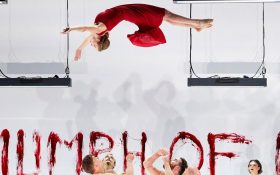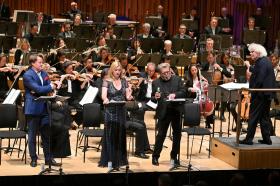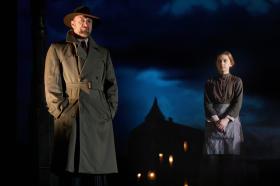It’s often said you can’t be true to your art without offending your mother. John Fugelsang, comedian, actor, ex-TV host and jack-of-all stages, whose one-man show All the Wrong Reasons is premiering at the New York Theatre Workshop, has been there and then some. Fugelsang’s autobiographical show rides on the therapy-inducing teaser that his mother, a former nun stationed in Africa and father, an ex-Franciscan monk from Brooklyn, left their first spouse (God, for both) to marry each other and spawn his talented second coming. Of course, this was the story he was never supposed to tell.
John Joseph, as his mother calls him, is a lanky figure with black hair, intense dark eyes, and a sculpted, pallid face (he describes it as “freakish paleness”). His manner is smooth, in a way that could be mistaken for the kind of slick ingenuousness that is bred in Hollywood (where he spent a long time as a self-dubbed “prompter monkey”), but closer examination belies a genuine earnestness and passion for his work.
Lured into television in his 20s, with his agent’s promise of more acting work and a pay check to eat off, Fugelsang traded in performing his applauded solo comedy gigs in New York cabaret clubs for work in LA, hosting frothy shows such as America’s Funniest Home Videos. Money, it seemed, quickly bred misery — he abhorred the mediocrity of television and a visible bitterness began to crack the spray-tanned façade. His initial dream of performing his comedic left-wing solo-shows Off-Broadway — in the spare and affecting tradition of his idol Spalding Gray — finally led him to the conclusion that he should return to the stage to tell his family story. “For all these years I had agents and friends and comedians telling me, you’ve got to write about what it was like to grow up the child of these two people.” But it wasn’t that simple.
“I don’t do personal material…I never even did sex jokes until I moved to Los Angeles,” he says wryly. And what’s more, Fugelsang’s mother forbade him to tell the story of his parents’ marriage, urging him to “lie,” to “fictionalize.” And it’s easy to understand why he obeyed. At the crux of his show is the specter of Catholic and/or parental guilt looming over all his actions — guilt so luminous that one could mistake Fugelsang’s parents for the All-Holy Father. And he didn’t want a reprise of their reaction to his controversial television run-in with a conservative ex-Klansmen (don’t even think about mentioning the war).
Despite these past sins, his mother eventually acquiesced, allowing him to write this play, where Fugelsang portrays her as a gentle Southerner and his father as the wise-guy Brooklynite. But the story is even greater — it is a political tale about the origins of sin, about drug smuggling, marriage (see Catholic guilt above), politics — and really: John J, the angst-ridden comic trying to make sense of his existence.
Would he have done the show without his mother’s permission? He wavers for a moment, uncharacteristically stumped, then answers quietly: “I probably would have had to scuttle it. Out of respect for them.”
Onstage, Fugelsang has a wide-legged stance (one foot planted in front of the other) so that he seems literally to be straddling the divide between stand-up and theatre (which he jokingly pronounces “thea-tray”). When he presented an earlier draft to NYTW in 2005 at PS122 (Spalding Gray’s old stomping ground), he was tentative about crossing the divide: “it was more commentary on how I wasn’t a real one-man show.” He was encouraged by Jim Nicola (artistic director of NYTW) to strip the stand-up out of the piece, but Fugelsang is still uncomfortable with taking himself too seriously.
Pam McKinnon, his director, has been instrumental in sculpting the piece. “The goal is,” she says, “even when scripted, to keep that seemingly improvisational-anything-can-happen kind of energy.” While the traditional story arc is clear, there are “all these little spurs of digressions,” she muses. In this way, the dual role of actor and stand-up comic is continually referenced, as Fugelsang cheekily notes: “I like to break down the fourth wall and let my audience know how off my characterizations are of family members.”
The pair had a snappy week-long rehearsal process — in which McKinnon broke up the sequence of the show, to keep it fresh and “bouncy,” she says, placing emphasis on the play’s non-linear structure. And this has resulted, says Fugelsang, in a structural anomaly: “normally you use a plot to sell political views; we’re using politics to sell a story.”
Standing in the light and airy rehearsal room in NYTW, Fugelsang gestures to the various theatre posters and notes that it was intimidating to rehearse in a room surrounded by these luminaries. And with this sincere statement, it’s hard not to imagine that his parents would be proud to see him immortalized on this wall, with his fellow artists.




